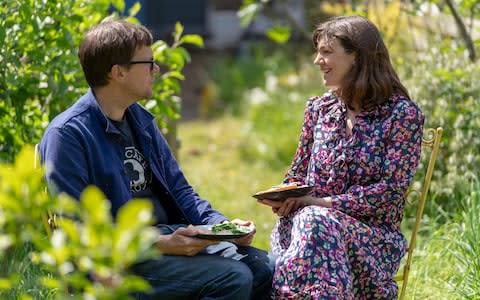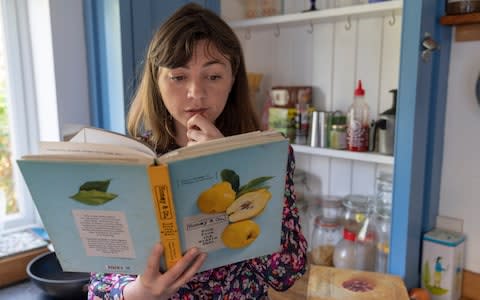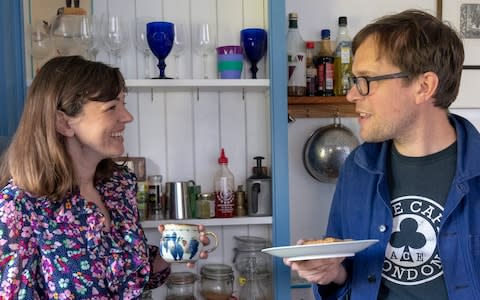Can microdating save your marriage?

Unbeknown to my husband, I am secretly dating someone. I feel morally justified in this, because the man I am dating is, well… him.
In case you missed it, Monday marked the start of Marriage Week 2019, an annual initiative set up by the Marriage Foundation to support an institution that is in a perplexing place. Divorce rates in England and Wales are at their lowest for 45 years. And yet, fewer straight couples than ever are getting hitched.
Married or otherwise, it seems coupledom could use a bit of help. According to a report by Legal & General, 67 per cent of parents who are still together believe that regular “date nights” play an important role in keeping it that way. Theoretically, that is. In practice, 41 per cent cited the cost of such dates as an impediment, while another 46 per cent pointed a weary finger at their own tiredness.
To most parents, this “news” will be about as novel as Stonehenge. My husband and I have two children aged five and seven. Sometimes we seem less like a couple, more like participants in a relay race. We meet regularly, but only in order for one of us to pass on the baton of school runs, World Book Day costumes and cheese sandwiches.
Help, however, is at hand. A new concept called “micro-dating” could be the answer to our problems. According to the report, this involves “recognising and appreciating those moments that already exist in your relationship… a touch on the arm, a kiss on the cheek, a knowing glance, a shared joke, a hand held, a shared meal – tiny things, but over time they add up and make a difference”.
As a working mother, I’m no stranger to to-do lists, so I promptly add “look for chances to reframe shared moments” to the top of the scroll. Aware that my husband might find the concept of micro-dating nauseating, I decide simply not to tell him. Which is how I end up secretly dating him.

Eating together is key: a Marriage Foundation study has found that shared mealtimes are “as vital as sex” for a long-term relationship. So at breakfast on Monday, I stare deep into Tom’s eyes over the chaos and cornflakes. He smiles back, confused. We are both working from home, so at 1pm, I suggest we have a romantic sausage roll together in the garden. “Have I… forgotten something?” he asks, nervously. By 3pm, when I bring him coffee, and then perch on the edge of his desk asking thoughtful questions, he appears to be verging on panic.
Micro-dating in secret, I have learnt, may not make your relationship more secure. Quite the opposite.
DAY ONE: WRITE IT DOWN
The next day, I come clean and ask Tom if, for the rest of the week, he would mind joining my micro-dating experiment. “Microdosing?” he asks hopefully, referring to the zeitgeisty trend for swallowing tiny quantities of psychedelic drugs with your breakfast. He looks slightly disappointed when I set him straight but, all in all, he is admirably game.
Hoping to make up for yesterday’s mistakes, I call Simone Bose, a relationship counsellor at Relate. Where did I go wrong yesterday, I ask.
“Everyone wants the same basic things from their relationship – to feel loved and appreciated, safe to express their emotional vulnerability,” she tells me. Micro-dating, therefore, makes sense – with one important proviso.
“Different people need love expressed in different ways,” she explains. “Some will feel comforted by the act of someone cooking for them, because it reminds them of positive experiences and emotions from their own childhood. Others will find that in hugs. That’s where the nuance comes in.”
Pick the wrong micro-date, and you could leave your partner cold. “If that’s the case,” says Bose, “the person making the effort can also feel frustrated and taken for granted, because their gestures are not getting the desired response.”
The solution? “Ask your partner,” suggests Bose. “Find out what little things make them feel loved.”
Tom and I each write a list of five things. It is difficult. In nearly 10 years of marriage and a further four of living together, we have never discussed these fundamental things. Worse still, I have never had the conversation with myself. Until I begin scribbling, I do not have a firm sense of what makes me feel loved. How, then, is Tom supposed to?

DAY TWO: LET'S EAT!
Tom is not working at home today. I consider Skyping him sweet nothings during his lunch break, and then remember that, as a kitchen designer, he is on a building site surrounded by men in hard hats who might not be fully “woke” to the concept of micro-dating. Instead, I call Jo Barnett, one of the UK’s leading relationship coaches. What does she make of micro-dating, I ask?
“It is important to get out of the house occasionally and go for a meal somewhere together,” she says. “It helps you to switch off from the washing or the kids’ homework.”
That said: “Once a week, it’s good to create a proper date and this can absolutely be at home. Just turn the phones off, switch the TV off, cook something special, together, and even light some candles. Ask questions about each other as individuals: what are your goals, what are you excited about at the moment…”
Over the past few years, Tom and I have slid into the shameful habit of sofa suppers. Not every night, but more than is healthy either for our bodies (dining with Netflix makes you greedier, according to Birmingham University researchers) or our relationship.

So I dig out a cookbook and resolve to make a special supper. Having finished work late, this requires parking the children in front of the TV. There is an irony here, I think. Investing time in my husband may be inversely proportional to investing it in the kids. But they are thrilled and Tom is chuffed. We manage approximately two minutes before talk turns to the children.
DAY THREE: JUST A TOUCH
Four days into micro-dating, I decide that we are ready to take it to the next level. I call Dr Rangan Chatterjee, a GP and host of the “Feel Better, Live More” podcast.
In his latest book, The Stress Solution, he writes that: “Romance is what teenagers do, and those in the first blushes of their relationships… It’s courting behaviour, but we’ve been conditioned to expect it to last forever… The romantic model, which is fed by pop music, Hollywood and fiction, has given us an impossibly high bar to meet.”
Maybe the whole concept of dating is, well, out of date once you are married? “I really suggest focusing on intimacy instead of romance,” he tells me. University College London researchers found that the simple act of affectionate touch reduces painful feelings of social exclusion, he reminds me. Touch can also slow heart rates, lower blood pressure, reduce cortisol levels and even boost levels of natural killer cells that fend off infections and cancer cells. However, as he points out, we are living in a time when these gestures are easily forgotten. “We’re all so busy, we have so many things to do,” he says. “And even when we do carve out time to be with our loved ones, we are often so distracted. My wife and I sometimes find ourselves sitting side by side, but both on our devices.”
In response, Dr Chatterjee has devised “the 3D greeting” which involves making deep and meaningful eye contact, embracing warmly and exchanging loving words.
“It takes 15 seconds,” he explains, “but it can make such a difference. Sure, it may sound forced at the start. But we need to make human connection a priority, in the same way that we do with teeth brushing. I’ve had so many readers get in touch to say it has changed the fabric of their relationship.”

Eager to experience a feeling of even greater forcedness, I decide to try an exercise from Dr Chatterjee’s book. Tom and I sit opposite one another, our knees touching. Then we set an alarm for five minutes, and attempt to look directly into each other’s eyes for the duration. At first, and as expected, it feels decidedly awkward. Soon, however, it begins to feel natural, even calming. I had forgotten, I realise, what kind eyes he has. When the buzzer sounds, we both jump. The time has passed astonishingly quickly.
It feels a little like a meditation, done together rather than in isolation, so that instead of reconnecting with an inner self, we have regrounded ourselves as a unit. It certainly feels better than bickering over whose turn it is to empty the dishwasher.
DAY FOUR: WE NEED TO TALK
Something strange is going on. Instead of my usual mood of cynicism mixed with sleep deprivation, I am feeling buoyant and positive.
Curious, I call Dr Amir Levine, psychiatrist and neuroscientist at Columbia University, and co-author of Attached, The New Science of Adult Attachment.
“The little gestures are what really make people feel secure,” he says. “We interpret our safety through the consistency and availability of other people, not through accumulating money, or having it lavished on us. Those things weren’t around when our emotions evolved.
“The reward system and attachment systems are intermingled in the human brain. That means simply being next to somebody is hugely rewarding. Something as simple as your partner greeting you with enthusiasm can feel amazing.”
When I hear Tom’s keys in the door, I get ready to pounce in what, with the benefit of hindsight, I can see may have been a slightly predatory manner. An anxious sound escapes his mouth as he stumbles back from the door. We are, however, about to drive to his parents’ house in Norfolk. This three-hour journey gives me ample time to fulfil point three on his list: talking in the car.

It is the end of the week and I am exhausted. All I can think about are work deadlines and the fact that the children’s school has announced yet another bake sale. So instead, I ask questions. My phone stays in my bag. As it gets darker, we lapse into companionable silence. It is really quite lovely.
DAY FIVE: THE SCIENCE BIT
So far, micro-dating has proved surprisingly straightforward. So I decide to push our British reticence further, and contact a place that sounds worryingly like an element of an Austin Powers film set: the Love Lab.
The Lab is the Seattle research headquarters of The Gottman Institute. Founded by married doctors John and Julie Gottman, it is renowned for its therapeutic programmes for couples. It’s motto, moreover, is “small things, often”.
“The major difference that separates happy from unhappy couples is this,” says Sinead Smyth, a certified Gottman therapist who trains UK and Irish therapists in the approach. “In happy couples, one partner will notice if their partner is trying to connect with them, (in Gottman lingo – a “bid for connection”). They will turn towards that bid, more often than not.”
This, she explains, can involve a question as simple as “how was your day?” Instead of cutting the conversation short with a simple, “fine”, in a happy relationship, the other partner might respond with something like: “It was rough. How was yours?”

“It’s these small words, acts and gestures of turning towards our partner’s bids that predict where our relationship will go over time,” says Smyth. “In fact, the Gottmans observed that happy couples turn towards each other in small ways 86 per cent of the time, whereas in unhappy relationships, partners turn towards each other only 33 per cent of the time.”
I resolve to return all Tom’s “bids” from now on.
DAY SIX: THE FUTURE...
It occurs to me that, while “micro-dating” might sound frightfully modern, it really all boils down to the simple, old fashioned principle of… being nice to each other.
So on the final day of my micro-dating challenge, I track down some couples who have been together long enough to call themselves true experts in the field.
Eileen and Peter Beadle, 71 and 78 respectively, celebrated their 51st wedding anniversary last weekend.
“It’s the little things that we do every day that matter,” says Eileen. “That, and respect for each other.
“So here is what we do. Since we have been married, we have always discussed our day over a beverage. While the kids were young, it was during the time we prepared the evening meal. When they were older we did it before we prepared dinner and now that we are retired we still sit at 5pm daily and chat about our day with a glass of wine.”
They also have kept a tradition of having coffee and home-made cookies in bed on weekends. “All simple things,” says Eileen, “but they have kept our relationship together for 51 years.”

Kevin and Tina Hayes (71 and 69) have also been married 51 years and tell me they recommend: “saying ‘I love you’ at least once every day (and meaning it of course). Holding hands, an impromptu kiss or hug, saying please and thank you, going out for coffee together…
“Most importantly, and this was from our very first date, we talk about things, from how we’re feeling, to shared dreams and aspirations, TV programmes, current affairs and even quantum physics and philosophy.
“We sometimes have to agree to disagree on a subject… So, for us, it’s simply being together and sharing. Love is a doing as well as a saying thing. Also, we have a duvet one size bigger than the bed.”
The key to a happy marriage, I have learnt, may well be small dates and big duvets.

MICRO-DATING MADE EASY
Sinead Smyth says...
Show regular appreciation and affection. The happiest couples are the ones that express a lot of positivity. Look for what is going well, what your partner is doing right, and tell them. Sometimes we take the positives for granted and get stuck on the problems, but having a positive view of your partner and sharing that with them will put deposits into your emotional bank account.
Carve out regular times to reconnect. Research shows that couples who stay interested in each other’s lives and are curious about each other have a much stronger friendship and a better sex life. Whether you go out or stay at home, make sure you are making time for planned micro-dates, where you focus entirely on each other, talk and, even more importantly, listen. Put your phone down and make this a special time, even if you’ve only got 30 minutes between getting the children to bed and taking a late work call.
Play together: make time for fun, just the two of you. A couple I work with go out to their garage once a week after the children are asleep and belt out some tunes on a karaoke machine left over from their dating lives in the Nineties. Playing together often comes last on the to-do list in our busy lives, but it creates trust and intimacy and helps deepen your connection. Couples that play together stay together.
Simone Bose says...
Learn a new skill together; investigate websites such as Udemy. You don’t need to go anywhere, but you will share an experience. You can even do the course in bed.
Cooking together is a great micro-date. Learn new dishes in each other’s company, then have a romantic meal afterwards.

 Yahoo News
Yahoo News 
